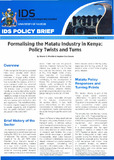| dc.contributor.author | Winnie, V | |
| dc.date.accessioned | 2017-01-03T12:04:33Z | |
| dc.date.available | 2017-01-03T12:04:33Z | |
| dc.date.issued | 2013 | |
| dc.identifier.uri | http://hdl.handle.net/11295/98621 | |
| dc.description.abstract | Public transport in Kenya has attracted
many policy debates which remain
unresolved. One debate which
continues to engage policy makers,
practitioners and the general public is
how to handle the matatus, a form of
public transport which has remained
resilient to almost all policy responses.
The industry plays a crucial role in
mobility and economics of the country
although it is often in the limelight for
inability to comply with public transport
regulations and attracting personnel
who are careless and resistant to rules
and regulations. This notwithstanding,
the sector requires supportive policies
to enable organizing and integration
into the public transport system, as
discussed in this policy brief. | en_US |
| dc.language.iso | en | en_US |
| dc.publisher | University Of Nairobi | en_US |
| dc.rights | Attribution-NonCommercial-NoDerivs 3.0 United States | * |
| dc.rights.uri | http://creativecommons.org/licenses/by-nc-nd/3.0/us/ | * |
| dc.subject | Formalising the Matatu Industry in Kenya | en_US |
| dc.title | Formalising the Matatu Industry in Kenya | en_US |
| dc.type | Other | en_US |



